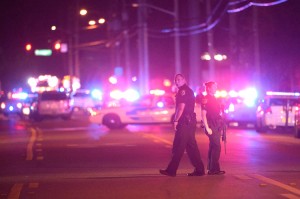Orlando Terror
Monday, June 13th, 2016June 13, 2016

Police officers stand guard near the scene of a mass shooting at the Pulse nightclub in Orlando, Florida, on June 12, 2016. Credit: © Phelan M. Ebenhack, AP Photo
Early Sunday morning, June 12, at the Pulse nightclub in Orlando, Florida, a gunman entered carrying an assault rifle and a handgun and started shooting. The gunman, 29-year-old Omar Mateen, shot several people before retreating deeper into the club and taking hostages. Orlando police, paramedics, and firefighters were quickly on the scene, but, unsure of what they were dealing with, they awaited the arrival of heavily armed Special Weapons and Tactics (SWAT) officers. About 5:00 a.m., SWAT officers broke through a wall of the nightclub. In a brief gunfight, Mateen was killed and one officer was wounded. Thirty hostages were freed, wounded bar patrons were treated and evacuated, and a suspected explosive device was destroyed. Forty-nine people died in the attack—plus the shooter—and 53 others were injured, making it the deadliest mass shooting in United States history. Some 350 patrons were in Pulse for a Latin music event at the time of the attack.
Mateen, a U.S. Muslim born to Afghan parents in New York City, apparently targeted the nightclub because it caters predominantly to the lesbian, gay, bisexual, and transgender (LGBT) community. While hiding in a restroom with hostages, Mateen called 9-1-1 and pledged his allegiance to the Islamic State, but there is no evidence that he had ties to the terrorist group. Mateen had, however, been questioned previously for suspected terrorism links. Mateen’s ex-wife described him as “emotionally and mentally disturbed,” and others noted a history of anger and violent behavior.
Numerous sympathies and tributes poured in to Orlando from around the world as people absorbed the shocking reality of the attack. President Barack Obama described the attack as an “act of terror and an act of hate.” Pope Francis condemned the “senseless hatred” of the massacre. This most recent mass shooting reignited calls for stricter gun control in the United States.


